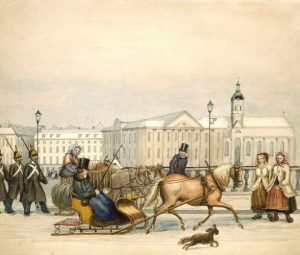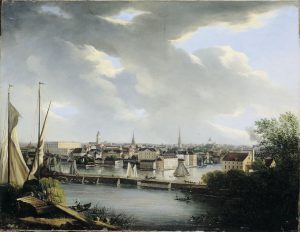Stockholm, March 12, 1851

Contemporary watercolor of Stockholm by Fritz von Dardel
Since Saturday evening I am here in Stockholm, our Swedish Paris, the dance-hungry’s Eldorado. Our journey here was miserable; unfavorable road conditions for the sleigh and grey, chilly weather. We ate bad food and slept miserably in cold, unpleasant lodgings, chatted with drunk coachmen, drank mulled wine, and finally arrived frozen and exhausted to our nice and beautiful Stockholm where we took in at Hotel Norrköping on Stora Nygatan. The day after our arrival, we waded through deep dirt to get to our friends on Kungsholmen where we became heartily received, had a pleasant evening, and dreamed us back to winter evenings at Krusenhof.

The view of Riddarholmen and the Old Town as seen from Kungsholmen. Augusta would have walked across the bridge; however, it was still March, so the lakes would have been frozen and the trees would have been bare.
Tante and Nanna have a small, sunny, and agreeable dwelling in the midst of a garden that extends right down to the lakeshore. In the summer, this little place might be a real paradise with flowers and light, fresh air and the view of Lake Mälaren’s blue surface, lush islands, and beaches to soothe the eyes, and glorious views of Riddarholmen and Södermalm and all the steamers that from different directions are rushing to their common goal at Riddarholmen’s quay.
Monday morning I went to visit Ribbingens and Bohemans. They were overly astonished to see me so unexpectedly in the capital city, and in the evening we saw the great opera, “A Tale of the Queen of Navarre.” There I met Count Figge Schwerin who escorted me home and was quite himself, much disposed to let his lady alone carry on the conversation and himself look like he was sleepwalking.
Mother and I were visiting Ribbingens today where, marvelously, Baron Fredrik happened to keep company and was as decent and agreeable as he can be when he wants to. We departed early, for I had a premonition that Lieutenant Wahlfelt could get the idea to transport his insipid personality to Clara {where Ribbingens lived}, which definitely would not have been pleasant.
We have left Lejdenfrost in the care of Wallenberg and we now traverse to the island of the poppy-crowned god.
Footnotes:
The family that Augusta visited at Kungsholmen was the family Hjort. The family had been Augusta’s closest neighbor and the children her best friends throughout childhood. In 1850, the family sold their estate, Krusenhof, and moved to Kungsholmen in Stockholm. The family members were Major Georg Leonard Hjort and his wife, Fredrika Elisabet Älf (referred to as Tante), and their children Aurora, Johanna (Nanna), Axel, and Erik.
Count Figge Schwerin is likely Fredrik Bogislaus (Fritz) von Schwerin who was born in Norrköping in 1825 (close in age to Augusta and from the same town). He was a captain in the army. Later in life, he became a banker, married, and had 2 daughters.
The family Ribbing and Boheman were good friends of the family.
Lejdenfrost was Augusta’s brother-in-law and benefactor.
The island of the poppy-crowned god is a poetic term for sleep – may be alluding to the effect of opium.
